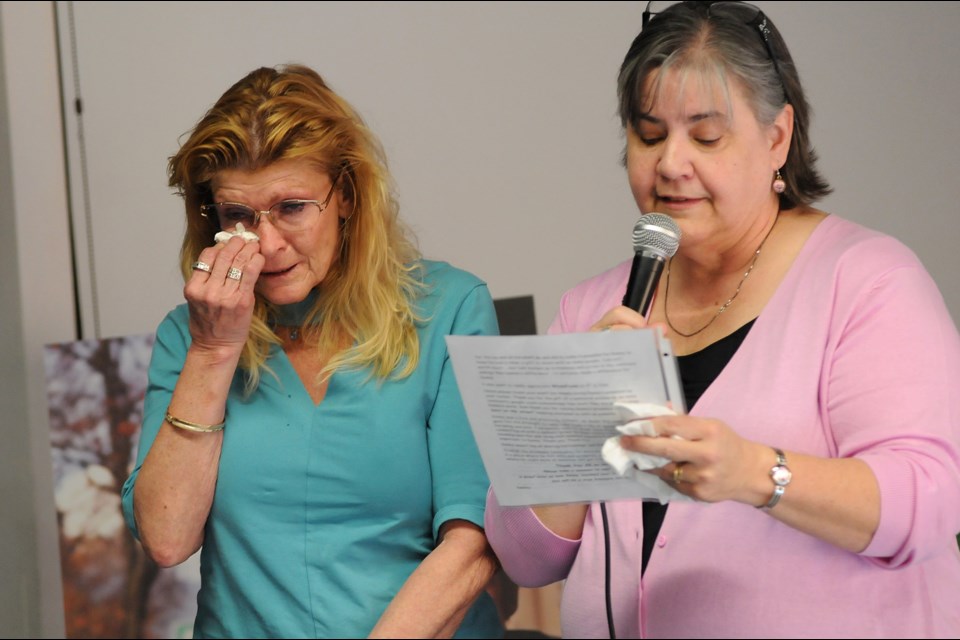To many who passed him by on the sidewalk, he was the rough-and-tumble guy in the big sweater at the corner of Fourth and Vine hawking the Megaphone street newspaper.
To those who stopped to give him two bucks for the paper and stayed long enough to exchange more than a hello and a goodbye, they found a new friend in Danny Maloney.
He had many friends.
About 100 of them, including his sister Debby, turned out Tuesday to a lounge in the Kitsilano Community Centre to pay tribute to the 62-year-old man. He died last month of lung disease at his Commercial Drive apartment.
“Danny wasn’t big on sharing his feelings, though I think he would thank the Kitsilano community for providing him with a home and making it a place where he felt safe and accepted,” said Janice McTaggart, who spoke to the crowd on behalf of Maloney’s overwhelmed sister, who wiped away tears as she stood next to her friend at the front of the room.
An enlarged photograph of her brother, a large bouquet of flowers and an urn containing Maloney's ashes filled the space to her right. A short movie about Maloney played in a loop on a back wall.
Before her, were rows of people in folding chairs, some she knew, some she didn't and others, such as Sean Condon who had a special relationship with Maloney as executive director of Megaphone, she met for the first time. A mix of men and women, including workers from the Whole Foods on 4th where Maloney became a friend to the staff, listened and shared stories for more than an hour about their favourite street vendor.
Stuart Rush, a 20-year Kitsilano resident, described Maloney as a “welcoming sentinel” to many in the neighbourhood, saying that “Danny’s passing has left a hole in Kits.” The Maloney he knew was “a visible conscience” to a homogeneous Kitsilano, bringing street life, poverty and “part of everyday existence” into the community.
“But it wasn’t just his presence, it was his demeanour — his smile, his humility and his interaction with people, which was genuine and engaging,” said Rush, one of the first speakers to take a turn at the microphone. “It is sad that Danny will probably never know that his modest presence on a busy street corner would have the impact that it has.”
Maryam-Val Morris said Maloney was her best friend, the two of them regular bingo players. Maloney shared bingo winnings with Morris and paid for the funeral of her mother’s boyfriend. He also saved her life, she said, telling a story about how she passed out at bingo one night and no one came to her aid but Maloney, who called an ambulance.
“After that, we became really close,” said Morris, her voice breaking. “He was an angel.”
Condon also had trouble getting through his turn at the microphone. He said he met Maloney on the street corner and soon got involved with the newspaper.
“Danny had a rough beginning in life, he didn’t get to start out...,” he said, pausing to regain his composure. “He didn’t have it easy, he didn’t have it easy, but it was through the paper that it really did change his life. And that’s because of the people here — his customers, who made him feel valued.”
Maloney sold Megaphone magazine and earlier versions of the publication, including Spare Change, for more than 20 years on the corner. He also sold the Hope in Shadows calendar, which was advertised on his baseball cap. He was there year-round, his friends said, in the rain, sun and snow.
He loved to talk politics, was up on the news, enjoyed 1960s music, vanilla ice cream, Hungry-Man dinners and smoked like a chimney. Some of his customers recalled how Maloney always addressed them as “miss” or “sir.”
“As much as he received from all of us, he gave so much more,” said Maria Coelho, who recalled how Maloney gave her a hug on a day that she needed more than counsel from a priest. “I would like for Danny’s legacy to be that we share more than an exchange about what the weather is like.”
The crowd heard how Maloney’s job gave him a purpose in life and helped him put a past of drugs, alcohol and prison behind him. It also led to a reunification with his sister Debby, who lost touch with her brother for 35 years. Both of them were born in Ontario, where their mother still lives.
As the story goes, Coast Mental Health, which has for years helped Maloney with his mental health and subsidized his apartment, awarded Maloney its Courage to Come Back Award more than 10 years ago.
Spare Change published a story about Maloney’s achievement, which was featured in an edition of the paper. A friend of Debby’s happened to pick up the paper while in Vancouver. She took it back to Debby, who lives in Langley. Debby contacted her brother over the phone, bringing the two of them together after more than three decades.
They could have reunited earlier, Debby discovered, after realizing she lived in Kitsilano for a period of time when her brother was working the corner. She remembers walking by that same corner but never gave the man with the newspapers a second look.
“If it wasn’t for the award and the paper, then I’d still be looking for him,” said Debby after the ceremony, which concluded with the crowd singing an impromptu version of Amazing Grace. “I’m glad I found him.”
twitter.com/Howellings



